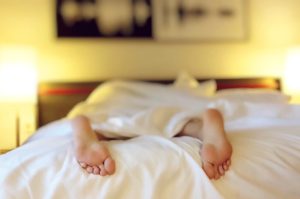This post is part of a series of guest posts on GPS by the graduate students in my Psychopathology course. As part of their work for the course, each student had to demonstrate mastery of the skill of “Educating the Public about Mental Health.” To that end, each student has to prepare two 1,000ish word posts on a particular class of mental disorders.
______________________________________________
Are We Sleeping Wrong, or Just Failing to Adapt? by Yasmin Shirali
 Open up any news story about sleep, and you will read that you are sleeping wrong. That’s right— add sleep to your list of failures. We constantly hear about how “screen time” before bed is ruining our ability to get good sleep. Dramatic headlines such as “Reading on a Screen Before Bed Might Be Killing You” are encountered almost daily. These stories are shared and re-posted by many on social media and soon become “common knowledge.” The problem is that this type of common knowledge is usually highly dramatized and often incorrect. If you hunt down the actual study corresponding to the previously mentioned headline, you learn that this dramatic conclusion comes from 12 participants whose sleep time was delayed for an average of ten minutes when using screens before bed. They do show that using screens before bed can lead to some negative consequences—but never do they mention death.
Open up any news story about sleep, and you will read that you are sleeping wrong. That’s right— add sleep to your list of failures. We constantly hear about how “screen time” before bed is ruining our ability to get good sleep. Dramatic headlines such as “Reading on a Screen Before Bed Might Be Killing You” are encountered almost daily. These stories are shared and re-posted by many on social media and soon become “common knowledge.” The problem is that this type of common knowledge is usually highly dramatized and often incorrect. If you hunt down the actual study corresponding to the previously mentioned headline, you learn that this dramatic conclusion comes from 12 participants whose sleep time was delayed for an average of ten minutes when using screens before bed. They do show that using screens before bed can lead to some negative consequences—but never do they mention death.
 Claiming that we are sleeping wrong is like telling Darwin’s finches that they were eating wrong when adapting to environmental pressures. Darwin’s finches demonstrate the consequences of environmental pressures on a species. A group of finches were isolated on the Galapagos Islands. Over time, these finches became very different from the mainland finches. Their beaks had completely changed shape in order to fill feeding niches in the environment. They adapted. If this situation had been covered by today’s media we would have seen headlines such as “You’re eating the wrong things” or “Eating worms is killing you.” These finches did not die, they did not fight the environment, they adapted and prevailed.
Claiming that we are sleeping wrong is like telling Darwin’s finches that they were eating wrong when adapting to environmental pressures. Darwin’s finches demonstrate the consequences of environmental pressures on a species. A group of finches were isolated on the Galapagos Islands. Over time, these finches became very different from the mainland finches. Their beaks had completely changed shape in order to fill feeding niches in the environment. They adapted. If this situation had been covered by today’s media we would have seen headlines such as “You’re eating the wrong things” or “Eating worms is killing you.” These finches did not die, they did not fight the environment, they adapted and prevailed.
Sleeping habits and patterns have always been changing and evolving. Our ancestors engaged in segmented sleep—also known as two sleeps. People would sleep for about four hours beginning at dusk, wake up for an hour or two at midnight, and sleep until dawn. These sleeping patterns were largely guided by the environment at the time. Sleep was heavily influenced by daylight. Sleeping from dusk to dawn would be too many hours, and thus waking up for a few hours in the middle of the night allowed folks to engage in intimate activities such as writing and interpreting their dreams, having sex, or having late night talks with family and neighbors. So are we sleeping the wrong way now because we sleep for a continuous bout of around eight hours? No, sleeping in two segments would not work for us now. Our environmental pressures changed and we adapted. Before segmented sleep, our ancestors slept next to large fires which protected them from harsh temperatures and predators. These sleeping patterns made sense for these environments. How can we know this? Because they survived.
Many people in some Mediterranean countries sleep less hours at night but sleep for one or two hours in midday. Many European countries even close shops, schools, and businesses from 1 to 5 in the afternoon. These different sleeping patterns arise from environmental pressures. This schedule would not work in the United States because our environment is not set up this way. We do not stop schools or businesses midday.
For some reason, many people do not think of evolution as something that is happening as actively now as it was before we began agriculture and completely changed our ways of life. It is as if people think that evolution stopped as soon as we left the “wild.” Environmental pressures are still affecting us—they just look different now. Our jungle is now made out of concrete, but it is still a jungle. Environmental pressures are still forcing us to change.
We have known for a long time that stress is a big influencer of the quality and duration of sleep we get. Yet suddenly it is screen time that is the enemy. Stress and worry right before going to sleep are especially deleterious to the quality of sleep attained. If playing a game or reading a book on your iPad before bed helps distract you from your stressors, is this not more beneficial than lying in bed without any lights and thinking about all the things you are worried about? It has been shown that effective coping skills for dealing with stress helps with sleep. Perhaps we should be more focused on helping people find coping skills for stress—which we know contributes to poor health—than on eliminating screen time before bed.
 There is conflicting evidence in studies looking at the impact of screen time on sleep. Several studies found that watching television before bedtime was not sufficient to cause impairments in sleep, while others did. It could very well be that it does not affect everyone in the same way. This is why variability in genes is one of the necessities for evolution. If we were all exactly the same, we would all be dead now. Genetic variability makes it possible for some to succeed even in times when most do not. Perhaps screen time before bed really is contributing to the death of many and will soon be an epidemic (#sarcasm) but not everyone will die a horrible death due to screens. Some will survive. The ones that survive will reproduce. Eventually, screens will no longer be the murderous villains they have been made out to be.
There is conflicting evidence in studies looking at the impact of screen time on sleep. Several studies found that watching television before bedtime was not sufficient to cause impairments in sleep, while others did. It could very well be that it does not affect everyone in the same way. This is why variability in genes is one of the necessities for evolution. If we were all exactly the same, we would all be dead now. Genetic variability makes it possible for some to succeed even in times when most do not. Perhaps screen time before bed really is contributing to the death of many and will soon be an epidemic (#sarcasm) but not everyone will die a horrible death due to screens. Some will survive. The ones that survive will reproduce. Eventually, screens will no longer be the murderous villains they have been made out to be.
Evolution has not failed us yet. Humans are still around. It is unlikely that screen time before bed will extinguish us from earth. It is unlikely that screen time before bed will even have a big noticeable effect on our species. So why are we spending all this time talking about it? Our fear-mongering society is keeping the angst alive. The stress that people acquire from reading dramatic headlines that generate fear is probably doing much more harm to our sleep than whatever the actual story is about. Limiting the amount of false and dramatized information that gets ignorantly spread around will probably do us much more good than not looking at our phones before bed. Technology is not going anywhere. Instead of insisting on fighting it, it may just be time to adapt.
